Matt Rees's Blog, page 42
June 4, 2009
Obama's speech: the view from Jerusalem
President Barack Obama spelled out what he expects of the Israeli government in his Cairo speech, issuing a challenge that most commentators here believe Prime Minister Benjamin Netanyahu has no way of meeting [I wrote on Global Post today:].
Obama’s speech, carried live on all three main Israeli television stations, made clear his firm opposition to any sort of building in Israel’s West Bank settlements. “This construction violates previous agreements and undermines efforts to achieve peace,” Obama said. “It is time for these settlements to stop.”
The realization that Obama is serious about halting settlements has been growing in Israel since Secretary of State Hillary Clinton visited in early March. At first Israeli politicians and diplomats thought it could be dealt with by the same sleight of hand that stymied previous administrations — Israel would agree to a freeze on settlement construction, except for “natural growth” to accommodate the children of existing settlers. In reality that meant as much building as Israel wanted.
Since Netanyahu’s visit to Washington two weeks ago, aggrieved Israeli government officials (who weren’t immediately available to comment on Obama's speech) have complained that there were unwritten agreements with the Bush White House allowing Israel to build in the settlements, provided they pulled out of “illegal outposts” — mainly composed of a few young settlers living in shipping containers on hillsides across the valley from existing settlements.
Obama’s speech made it clear that such unwritten promises are not part of the debate. Read more....
Obama’s speech, carried live on all three main Israeli television stations, made clear his firm opposition to any sort of building in Israel’s West Bank settlements. “This construction violates previous agreements and undermines efforts to achieve peace,” Obama said. “It is time for these settlements to stop.”
The realization that Obama is serious about halting settlements has been growing in Israel since Secretary of State Hillary Clinton visited in early March. At first Israeli politicians and diplomats thought it could be dealt with by the same sleight of hand that stymied previous administrations — Israel would agree to a freeze on settlement construction, except for “natural growth” to accommodate the children of existing settlers. In reality that meant as much building as Israel wanted.
Since Netanyahu’s visit to Washington two weeks ago, aggrieved Israeli government officials (who weren’t immediately available to comment on Obama's speech) have complained that there were unwritten agreements with the Bush White House allowing Israel to build in the settlements, provided they pulled out of “illegal outposts” — mainly composed of a few young settlers living in shipping containers on hillsides across the valley from existing settlements.
Obama’s speech made it clear that such unwritten promises are not part of the debate. Read more....
June 1, 2009
Everything's better in Paris
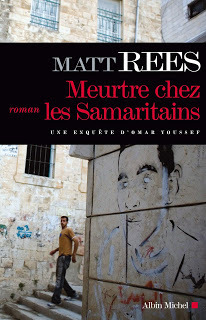
It’s great to hear good news. It’s even better to hear it when you’ve just arrived in Paris. Everything sounds better when you hear it in Paris.
Last week I had a few days in the French capital courtesy of my publisher Albin Michel, which brought me over for the release of my third Palestinian crime novel “Meurtre chez les Samaritains” (English title: “The Samaritan’s Secret”).
On arrival my publicist, a delightful Marseillaise named Agnes Chalnot who works with the elegantly Parisienne Florence Godfernaux, informed me that the first of my Palestinian crime novels “Le Collaborateur de Bethleem” (“The Collaborator of Bethlehem” in the US; "The Bethlehem Murders" in the UK) had been shortlisted for the Prix des Livres de Poche. The winner will be announced in the autumn, but in the meantime it was a lovely way to start my visit.
Albin Michel usually puts me up in the Hotel Lennox, just around the corner from their offices in Montparnasse (that’s the 14th Arondissement, if the numbers make sense to you as they spiral out from the very center of Paris…). It’s a fabulous old artistic area. Norwegian-born photographer Ulf Andersen has lived in the neighborhood a long time and, as we walked about, he showed me the atelier where Picasso used to work, the café where Sartre (“He was very ugly,” Ulf remembers) used to have his morning coffee, and the art deco Hotel Aiglon where Bunuel used to stay when he visited Paris. Nowadays Montparnasse is a bit too pricey for artists, who tend to live in the area near the Bastille.
I enjoy returning each year to Paris when my books come out. Partially that’s because of the culture of books and intellectualism that’s specific to France. The head of Albin Michel who’s a great supporter of my books, Olivier Betourne, used to be the editor of Jacques Derrida, the great deconstructionist philosopher, and my editor Vaiju Naravane is a polymath Indian woman who’s able to tell hilarious tales of trekking to the furthest regions of southern India with Shiva Naipaul.
It’s also because I’ve come to know some of the journalists I meet quite well, particularly those like Philippe Lemaire of Le Parisien and Vladimir de Gmeline of Valeurs Actuelles who have been out to Jerusalem to tour the West Bank with me. This year Philippe remarked that I seemed more relaxed than when my last book came out. I was pleased to hear it, and I must credit my wife Devorah and my son Cai for calming me down!
Another friend I was glad to see during my quick visit was Francois Busnel. He’s one of the most important literary journalists in France and he has an approach to his work that’s vastly different from most of those who write about books. Francois came to Jerusalem to write about me a couple of years ago. He travels each month to interview writers around the world. This summer he’s spending a few weeks in Afghanistan with his friend Kabul-born Atiq Rahimi, who won the Prix Goncourt last year. Not your typical book reviewer, as you can see. If you read French, take a look at his articles in L’Express. They’re excellent.
With only a few hours left in Paris, I picked up a Quiche Lorraine and feuillete de Roquefort near the parliament. The quiche you probably know has chunks of ham. The feuillete is a rich, rich pastry packed with Roquefort, and frankly it was a little too intense for me. But as I sat in the Jardins du Luxembourg with my pastries, watching the French reading books (not playing with Blackberrys) beneath the massive bust of Paul Verlaine, I wished I could take a little of their ethos home with me.
May 31, 2009
Indonesia debates my Grave in Gaza
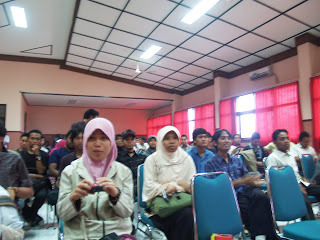
I’ve been extraordinarily impressed with the job my Indonesian publisher is doing with my Palestinian crime novels. It also turns out I have something in common with a popular former President of Indonesia.
My editor at Dioma Publishing in Malang, Indonesia, Herman Kosasih filled me in on a couple of events they organized there for the launch of A Grave in Gaza (it’s the second of my Palestinian novels, but Dioma decided to publish it first; they’ve purchased rights to the first four books). That includes a debate at the Islamic University in Malang.
This is particularly important to me because Indonesia is the first Muslim country in which my books have been published. As the hero of the books is a Palestinian Muslim, I’m very keen that his story should be read by Muslims around the world.
Here’s a little of what Herman wrote to me about the debate at the Islamic University: “It was great. There were Quran readings, prayers, speeches. Then the Indonesian National Anthem and the Hymn of Pergerakan Mahasiswa Islam Indonesia, which is the Association of Indonesian Islamic Students. Present were the Vice Rector of the university and the representatives of the movement throughout Malang. 200 people attended it. Wow. I was very surprised to see them all. Out of my imagination.”
Mine, too. Wonderful news.
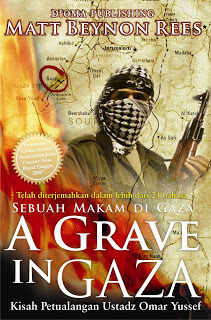
Herman continues: “There were many questions including whether the author had a plan concerning Palestine and Israel when he wrote this novel. They agreed that cruelty and murders can be done by people with various religions. The atmosphere of religion influenced the discussion.
“The dean of the Law Faculty said that your idea in the novel is similar with what Gus Dur has said concerning Middle East affairs. Gus Dur is a former president of Indonesia, a proponent of minority rights in Indonesia and a champion of religious dialogue. He is much beloved among the students who most of them are followers of NU, a branch of Indonesian Islam. They are usually moderate and traditional.
“I concluded that they appreciate your novel. I also made some friends there.”

It’s clear to me that the debate in Indonesia was thoughtful and carried out with consideration for other people as humans – rather than in a spirit of religious antagonism. I’m very touched by that.
In another email, Herman told me: “On May 15, 2009 we had a kind of talk show in Jakarta in one of the biggest bookstore chains in Indonesia for A Grave in Gaza. The speaker was a journalist who has visited Middle East.”
Herman also sent me a lovely set of playing cards from Bali. I’m using them to teach my little son how to count.
May 30, 2009
Magically Inventive: Darren Craske's Writing Life interview
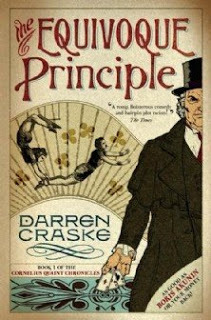
The Victorian-era crime novel has been a firmly established sub-genre from Sherlock Holmes to Anne Perry’s William Monk. But it has never seen anything like Cornelius Quaint. The hero of Darren Craske’s devilishly cunning new series (the first book, The Equivoque Principle, is just out in paperback) is a conjurer whose sleight of hand is matched only by the author’s ability to twist his plot like some contortionist colleague of Quaint's in Dr Marvello’s Travelling Circus. Craske is something of a man of mystery himself, having declined to provide a photo of himself for this interview. But even if you can’t see his no doubt handsome features, you’ll find he reveals enough of himself to make it clear exactly where the inventiveness of his novel comes from. He also outlines a route to publication that's different from the one most aspiring authors would expect to take.
How long did it take you to get published?
I would say that it took me somewhere in the region of 3 years to actually get a publishing deal, although THE EQUIVOQUE PRINCIPLE was sent to only one publisher, and the deal was struck pretty much instantly. I submitted several chapters of THE EQUIVOQUE PRINCIPLE to THE FRONTLIST website (www.thefrontlist.com) which is a great place for aspiring writers to display their work, and receive criticisms and guidance from peers who are all trying to snare that elusive publishing deal. The idea is simple: you place your work online, and in return must critique several other authors’ work and grade it on a points system. Those works receiving the highest marks automatically get sent on to Scott Pack at THE FRIDAY PROJECT, a vibrant company now under the wing of HarperCollins, that specialize in making fab books out of online material. THE EQUIVOQUE PRINCIPLE was read, and I received a request to send the completed manuscript along. I guess Scott saw promise in this young writer’s work, and soon a deal was offered for three books in the Cornelius Quaint Chronicles series and that was that. A far cry from my budding writer days.
I have gone through the whole slush pile reject thing, and I know exactly how most young authors feel. I can vividly recall wading through THE WRITERS AND ARTISTS YEARBOOK at my local library, compiling a list of contacts, then sending off my work, waiting patiently as the weeks ticked by, watching the postman approach my house, and wondering whether this was ‘the one’. The other books that I worked on prior to signing were just not good enough, or I was just not a good enough writer back then. I have revisited much of the old work since. I have tarted them up a bit and reshaped whole sequences, sometimes the entire plot. I do not believe that any ideas are wasted ones, and I have dipped into this little pool of potential ideas many times over the years, and even included some action sequences from way back in 2003 in some of the forthcoming Cornelius Quaint novels. I have a folder on my hard drive with a ton of ideas. Some just the bare bones, some fully fleshed out and completed, and some nothing more than a blank page with a title.
Would you recommend any books on writing?
I found that a lot of the so-called ‘self help’ books can be distracting, and too often a great idea can be watered down and even killed off by worrying too much about the whys and wherefores. I would say first and foremost is to get yourself a damn good plot – or some damn good characters and create a damn good plot along the way. I would recommend to any newbie writer that you join an authors’ forum and get some guidance from people who are in the same boat as you. There are a load of them about -- You Write On, The Frontlist, Writers News talkback etc. You’ll learn far more from writing from an unbiased peer than anything you’ll read in a How To book.
What’s a typical writing day?
Well, in my writing no day is typical. A lot of my ideas are created just before I go to sleep. Dialogue, action, plot points, alterations etc are all fleshed out whilst my head is on a pillow and then committed to my laptop the next moment I can get. I have a trusty notebook by my bedside, and regularly scare the crap out of my wife by snapping on the lamp and scribbling like a madman for five minutes, only to flop back down and start again. Needless to say, she is fairly understanding!
Once I know where I am going with a book, I let a lot of it write itself. Things just happen in due course. I am presently working on the 4th Cornelius Quaint novel called THE ROMULUS EQUATION, and from what has been set up in the previous novels, there is a definite place that I need to get to, and so I write and craft and edit and shape until I get there. It’s kind of like going on a long car journey. I know where I’m going, even though I have no sat-nav to get me there, and I only have a vague idea what it will be like when I get there. But there are defined refueling points along the way that I need to reach if the ending is going to make any sense. When I know I am almost there, writing the last quarter of a book is an amazing rush.
Plug your latest book. What’s it about? Why’s it so great?
My latest novel is also my first; the first in a series that I hope will be around for some time. THE EQUIVOQUE PRINCIPLE is many things, and I am so proud of what I have created, and I know it will surprise a lot of people. It has been compared the THE VESUVIUS CLUB and THE GLASS BOOKS OF THE DREAM EATERS, but to lump EQUIVOQUE in with those fantastic novels would be doing it only half a service. At its heart, THE EQUIVOQUE PRINCIPLE is a Victorian detective adventure, a brand new world based on familiar foundations – yet along the way the story evolves to such a degree that NO ONE will be able to predict where it is going next. Let me just say that the word equivoque to the uninitiated means a double meaning, or a misdirection – and it is no coincidence that the main character is a master of slight of hand conjuring. THE EQUIVOQUE PRINCIPLE is unique, and once we get to the end, the possibilities of where the sequels take us are as unpredictable as Cornelius Quaint himself!
How much of what you do is:
a) formula dictated by the genre within which you write?
Not so much formula as the timestamp of history. As my books are set in the Victorian age, many times have I written something amazing only to have it stomped on by history. Writing historical based novels makes your palette a little more restricted, yet it also frees you up to do great things. Compare the older James Bond films and movies like the Indiana Jones trilogy where everything was staged for real. The explosions, the locations, the stunts, the bangs and the blasts – they were done live. In this day of CGI it has flattened and removed a few layers of the art of believability, so when I write some of my action sequences, this is what I have in mind – ground yourself in reality as much as you can and then play like hell with it.
b) formula you developed yourself and stuck with?
Although my Cornelius Quaint books can be pigeonholed in amongst the Victorian detective genre, I think by the time the reader gets to the end they will pretty much forget that notion as anything can happen moving forwards.
c) as close to complete originality as it’s possible to get each time?
My stories, the plots, the characters and dialogue are as original as it gets in that they sprang from my creative mind, but I think it’s a mistake to forget every piece of literature ever written, every film seen, every piece of music heard. There are no original ideas, only old ideas done completely differently.
What’s your favorite sentence in all literature, and why?
That’s a good question, but I think for me my favourite sentence is this one:
"The ships hung in the sky in much the same way that bricks don't." by Douglas Adams from The Hitchhhiker’s Guide to the Galaxy.
What’s the best descriptive image in all literature?
Hmm. I can’t say what exactly, but I can tell you who writes it – David Mitchell. Cloud Atlas contains some of the most superlative examples of literary delight that I have ever read, in much the same way as you slap yourself on the forehead and wish to god that you’d written that line yourself.
Who’s the greatest stylist currently writing?
I love a whole host of people who are masters in their field, but not necessarily for the reasons you might think. Eoin Colfer, Phillip Pullman, Neil Gaiman, JK (the goddess) Rowling, Michael Moorcock, Gideon Defoe, Paul Stewart and Chris Riddell to name but a few.
Who’s the greatest plotter currently writing?
Unashamedly I would have to say JK Rowling, for the effortless interconnections of some superb subtleties of plotline. If I ever met her, I really want to know if it was all as intentional as it seemed…JK, if you’re reading this, drop me a line. Inquiring minds want to know.
How much research is involved in each of your books?
Too much, but that’s the price I pay for setting my books in the 1850’s. It’s not really my fault. In Who Framed Roger Rabbit, Jessica Rabbit says: ‘I’m not bad…I’m just drawn that way’ which is probably my second favourite line. The fact that she’s an animated rabbit only adds another layer to it – but the idea for THE EQUIVOQUE PRINCIPLE along with all the characters in Dr Marvello’s Travelling Circus announced themselves to me one night in a bewildering display of subconscious thought. I did not choose to write about Cornelius Quaint’s adventures…he chose me.
Where’d you get the idea for your main character?
Cornelius Quaint arrived in my head one night and forcefully introduced himself. I was immediately enthralled. Madame Destine arrived soon after, and she was as much a mystery to me as she is to Quaint. So, Cornelius and I set about trying to learn as much about her as we could.
Do you have a pain from childhood that compels you to write? If not, what does?
A pain from childhood. Hmm, now where could I go with that one? I always had the writing bug, even from a tender age, but I am also an artist (I part illustrated the cover to EQUIVOQUE) and so immersed myself more in comic strip art than the story. My skills as a writer were always there, but I relied on my art to tell the story. I suppose that I was an okay-level footballer with a championship manager inside of me waiting to get out.
What’s the best idea for marketing a book you can do yourself?
The best idea would be to write a book totally in red and green ink, and then send some satellites up into space and use gigantic manufactured 3D lenses to cover the sun – which would render all printed word illegible, except for my own novel. Ergo, I would rule the world with the written word.
What’s your experience with being translated?
It has yet to happen, but as the royalties increase – I’m all for it!
Do you live entirely off your writing?
No, I have a ‘real’ job to supplement my mortgage, wife and kids. The books are a vocation that became a hobby that if I am really, really lucky will enable me to focus on them one hundred percent. Most writers have to struggle to make ends meet, and as much as I’d like to proclaim that I am part of some avant-garde, that don’t pay the bills.
How many books did you write before you were published?
3. Two of them were pretty rubbish, but one is great and it will see print if it kills me.
What’s the strangest thing that happened to you on a book tour?
Not yet done a book tour, but I hope that something strange will occur – as long as it’s nothing to do with being late. Unless it’s worth it. Like being abducted by aliens, or something. That opportunity only comes around once, or twice if you live in the deep south of America.
What’s your weirdest idea for a book you’ll never get to publish?
I’d rather not say, because one day I do hope to publish it – it’s dead good, and it is about a basket of dirty washing waiting to go into the washing machine. It’s very Pixar, and kids all over the world would be wearing the main characters (socks and a pair of underpants) quite literally as socks and a pair of underpants. Anyone thinking of plagiarizing that idea, two words of warning: I SUE.
Next in The Writing Life: Watch out, God! Here comes Shalom Auslander.
May 28, 2009
Toronto Star: Palestinian crime novels the key to happiness
Toronto Star Mideast correspondent Oakland Ross writes about my path to happiness -- via the less than happy occurrences of the region. It's a different, more personal kind of profile than the sort of thing journalists usually write, which is perhaps due to the novelist's sensibility Oakland brings to the piece (He's the author of historical novels set in Mexico.)
Welsh writer quit Time magazine to pen books in popular sleuth series
May 27, 2009 Oakland Ross MIDDLE EAST BUREAU
JERUSALEM–Happiness did not find Matt Beynon Rees.
Instead, Matt Beynon Rees found happiness.
First, however, he was obliged to travel to the Middle East, not a region of the world noted for an over-abundance of glee. Read more...
Welsh writer quit Time magazine to pen books in popular sleuth series
May 27, 2009 Oakland Ross MIDDLE EAST BUREAU
JERUSALEM–Happiness did not find Matt Beynon Rees.
Instead, Matt Beynon Rees found happiness.
First, however, he was obliged to travel to the Middle East, not a region of the world noted for an over-abundance of glee. Read more...
Global Post: Bibi in a corner
Obama presses Israeli Prime Minister Netanyahu to stop building in West Bank settlements. By Matt Beynon Rees - GlobalPost May 26, 2009
JERUSALEM — One morning late last week, Israeli Border Police showed up at Maoz Esther, an outpost of Israeli settlers in the West Bank near Ramallah. They waited for a Bible study class to finish, tore down the settlers’ five little shacks and ran the residents off.
A few hours later, the settlers returned, nailing together the battered pieces of drywall shunted aside by the government. Maoz Esther rose again.
This kind of half-hearted approach to clearing out illegal outposts is the way Israel has always handled the settlers. Read more...
JERUSALEM — One morning late last week, Israeli Border Police showed up at Maoz Esther, an outpost of Israeli settlers in the West Bank near Ramallah. They waited for a Bible study class to finish, tore down the settlers’ five little shacks and ran the residents off.
A few hours later, the settlers returned, nailing together the battered pieces of drywall shunted aside by the government. Maoz Esther rose again.
This kind of half-hearted approach to clearing out illegal outposts is the way Israel has always handled the settlers. Read more...
May 24, 2009
Acid attacks, crucifixion, and a new Patricia Cornwell: Caro Ramsay's Writing Life interview
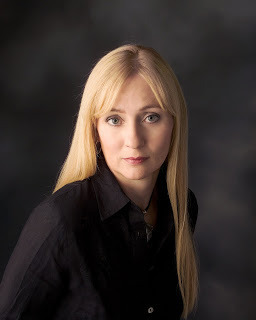
Caro Ramsay’s debut “Absolution” is one of the most disturbing thrillers you’ll ever read. It features a beautiful woman who’s the victim of an acid attack and a series of disembowelments in the “Crucifixion killings” of young women. Caro’s also from one of the roughest neighborhoods of Glasgow, where she sets her novels. Would it surprise you to learn, then, that’s she’s an extremely charming person? We met last year at an awards dinner in London (where she trained as an osteopath) and I’m delighted that she agreed to answer the questions I pose in The Writing Life. (For American readers, osteopathy is a British form of medicine involving manipulation of the muscles and bones. It hasn’t really taken off in the U.S. It’s a bit like what a U.S. chiropractor does. Although I’m sure I’ll get emails now from outraged osteopaths and critical chiropractors who disagree. In any case, it doesn’t involve crucifixion, although my mother who once had to visit an osteopath for a slipped disc said it felt like it.) Out earlier in May in the UK, Caro’s new book “Singing to the Dead” was, for many of her fans, a long time coming – not that she’s been lazy, it’s just that a year and a half is a long time to wait in the world of crime fiction! But the response from readers, who’ve already made it a bestseller in Scotland, shows that it was worth it. She’s often compared to fellow crime-writing Scot Ian Rankin – he’s Edinburgh to her Glasgow. With her own medical background, a better comparison might be the medical thrillers of Patricia Cornwell.
How long did it take you to get published?
The first thing I wrote was picked up by an agent and sold to Penguin so it was instant for me. It was never a plan of mine to become an author. I was lying in a hospital bed unable to move for a long time and wrote 250,000 words because I was so bored. Those words became two novels - Absolution and Singing To The Dead.
How long did it take you to get published?
The first typescript I sent away was accepted by an agent and subsequently sold to Penguin. My agent does do a fair bit of in-house editing and I think they saw in that first draft somebody who had a gift for writing but who had no idea how to put a novel together. But once I had learned that (very hard) lesson the book was immediately offered to Michael Joseph at Penguin and they immediately accepted. So compared to other authors I was very lucky. The lucky thing was having a very good agent!
Would you recommend any books on writing?
None that I have found really helpful. I think I found it of more benefit to read a lot in my own genre, finding out what worked for me and what didn’t. My philosophy is to write what I would want to read!
What’s a typical writing day?
Chaotic. I get up about six thirty, feed animals, do some writing, look at the next bit that needs done, go to work, think about what I am going to write next while driving etc come home at night and eat a sandwich for tea while writing the bit that has been forming and evolving in my mind during the day. I have two big writing days a week when I sit all day and type. On these days I can do 7,000 words a day easily. Plot problems tend to work themselves out when you are not sitting at the computer. I have no problems with discipline, I am obsessive about it and if don’t write every day I get withdrawal symptoms. An academic summed it up for me – creativity time and productivity time. They are not the same thing.
Plug your latest book, what’s it about? Why’s it so great?
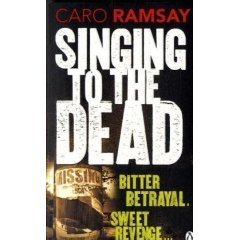
It’s about child abduction, food tampering, the nature of celebrity, sibling rivalry, murder, death … usual every day stuff of life’s rich tapestry. As it was written at the same time, it is technically, the second half of the first book, but it has a very different flavour. It’s very up close and personal. A serial killer out on the dark streets of Glasgow in mid winter is one thing but suspecting he might be sitting next to you on the bus every morning is much more chilling!! As I write it’s sitting at number 4 in the charts (crime Scotland!) so I‘m feeling very pleased.
How much of what you do is:
a) Formula dictated by the genre within which you write?
b) Formula you developed yourself and stuck with?
c) As close to complete originality as it’s possible to get each time?
Good question for somebody who has only written three books! I like my genre, I like my characters, so there is a very precise framework that I work within, yet within that framework I think it is possible to write books of different style and timbre. I’m not really an experienced writer at all, I’m from a medical background and I feel I need the support of my well known supporting cast to help me through. I have never felt the need to break away from my serial characters but time will tell.
I am a bit tentative about saying it because I don’t think I can look at it objectively myself but it has been reviewed as one of the best novels this year so far and a Canadian review said “crime writing does not get any better.” For some reason I already have a big following in Canada all those ex-pat Scots maybe.
What’s your favourite sentence in all literature, and why?
“I’d far rather be happy than right!” Slartiblartfast says it in Hitch Hikers Guide to the Galaxy - Douglas Adams. Great philosophy on life and it’s a fantastic closing line if losing an argument at a party. I’m having it on my gravestone.
What’s the best descriptive image in all literature?
Am I allowed the only one I remember most clearly? It’s the first paragraph of Black Beauty by Anna Sewell, a fantastic book full of philosophy and wisdom re the nature of our relationship to the world around us.
Who’s the greatest stylist currently writing?
Have to say since I started writing I have no time to read, so I’ll pass on this one re the word currently. But PD James full stop!
Who’s the greatest plotter currently writing?
Nobody really stands out, I’m afraid. I know Reginald Hill’s plots are not horrifically complicated but it’s hard to see past him for plot/ character balance. As you might guess, I don’t read much American crime so apologies for that!
How much research is involved in each of your books?
A full time, demanding job means I do write about what I know so lots of medical stuff per murder. I have lots of friends in low places (cops and lawyers) who love to help out over a coffee… and the rest is done on the internet. The third book is about malignant narcissism. My training in psychology helps me to plan the book, then I very carefully research the specifics I need. Only a fine peppering of the research I do gets in the book.
Where’d you get the idea for your main character?
My characters tend to arrive in my head fully formed and ready to go. (This can be a sign of mental illness!) I know there is a debate as to whether characters can take over the plot … the ‘whose fingers are on the keyboard?’ argument. But in my case, they do and layers of their persona come out as the demands on the character grow (often to my surprise) but I guess that’s the creative subconscious mind working in full flow.
Do you have a pain from childhood that compels you to write? If not, what does?
No, not really. I had a very nice childhood in what would be considered the deep badlands of Govan, one of the hardest areas of inner city Glasgow. I make a conscious decision not to portray my home city in that way, it’s been done to death – pardon the pun.
I think all writers have a tendency to look on life from a slightly sideways perspective and I’ve always been aware of that. My siblings and I could view the same situation and I would walk away with a totally different interpretation of events - mine always being slightly on the dark side.
What’s the best idea for marketing a book you can do yourself?
I’m still finding my way in this writing world but I run a very successful practice outside my writing life. The same rules apply in any walk of business - give value for money, show you care, do that little extra … and they will remember you as a ‘good thing.’ I get paid a lot of money for my books so when my publisher tells me to jump, my only question is ‘how high?’
What’s your experience with being translated?
My natural language is broad Glaswegian and my editor sometimes asks to translate it into English!! But foreign transcripts have been very kind, i.e. the word ‘skelf’ is a common word for a splinter (as you would get in your fingertip from a rough piece of wood). A few translators emailed me to gauge the politeness of this word. Once I told them my 105 year old granny would use it… they were happy. In some languages I think a splinter can have a rather rude connotation! My experience of translation has been very positive.
Do you live entirely off your writing?
I could live off my writing now but I’m blessed to do a day job I love so I don’t want to give it up. I get paid lots for my hobby, but I can see a time, maybe after book four when I will have to choose. Not a decision I am looking forward to.
How many books did you write before you were published?
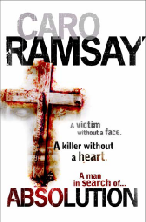
Got the first one published. No dusty typescripts under the bed or anything.
What’s the strangest thing that happened to you on a book tour?
Ermmm, a very drunk Irish journalist had a go at me - a teetotal Glaswegian in a bar at one in the morning … (he was never going to win) and after a few choice words on both sides, we found out our granddads knew each other! After that we were the best of pals – a very Celtic thing!
What’s your weirdest idea for a book you’ll never get to publish?
There’s a cartoon character who appears in book two, Squidgy McMidge who is a very politically incorrect cartoon character who goes about causing chaos with his friend Bonsai McMidge. But as I write this there has already been an approach made re the copyright of Squidgy The Mighty McMidge. He even has his own theme tune now. And a Tee –shirt!
May 23, 2009
Elmore Leonard in Bangkok
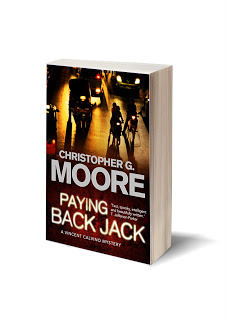
Christopher G. Moore was good enough to send me an advance copy of his 10th Vincent Calvino novel "Paying Back Jack" which will be out in October (December in the UK). I love the Calvino series for the way it leads the reader into the underbelly of Bangkok in the company of its Italian-Jewish New Yorker private eye. PBJ gives us that and much more. Moore creates a cast of vibrant characters worthy of the best Elmore Leonard caper for this hard-edged, stylish mystery. With the story of snarling Special Ops hitmen and smiling Thai hookers, Moore skewers the simplistic logic of the "war on terror," lays bare its worldwide destructive power, and shows the price it makes people pay. His Vincent Calvino is at once in the finest tradition of the lone private detective and a complete original. Until PBJ hits bookshops, try "Spirit House," my favorite of the earlier Calvino novels. You can also read my interview with Moore from a little over a month ago.
May 22, 2009
Mother and Son, Wars and Recipes
War correspondent Matt McAllester fled into the fields of battle to escape an alcoholic, mentally ill mother. In his memoir, Bittersweet, he tries to make amends with her, in the kitchen. Read my interview with McAllester on The Daily Beast.
Published on May 22, 2009 05:21
•
Tags:
alcoholic, bittersweet, dailybeast, intifada, journalism, mcallester, memoir, war
May 21, 2009
The Queen of Quirky: The Writing Life interview with Tama Janowitz
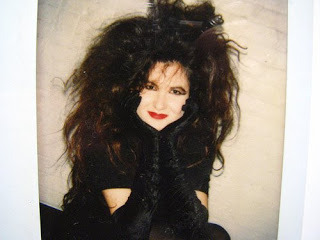
Tama Janowitz has always been great at first lines (Remember her Slaves of New York opened with this: “After I became a prostitute, I had to deal with penises of every imaginable shape and size.”) Her new novel, they is us, will be out in September in the U.S. (It’s already published in the UK by The Friday Project) and she strikes again with a first paragraph that seems to carry all our fears of a technologically mutated future and our present discontent with a changing world: “Years pass. There are still thimbles and Unitarians. The world is the same as it has always been, maybe a little worse. It’s a beautiful summer day, kind of, although violent electrical storms are predicted for later – if not that day, then sometime. And the news, too, is much the same: 40 percent of people can’t sleep; a type of bustard believed to be extinct has been found; war continues.” It’s an astonishing novel, its weird quirkiness a mask for a powerfully grounded nuts-and-bolts skewering of modern society. You may gather from Tama’s interview with me that she could’ve easily titled the book dystopia is tama. In fact, she unveils some astonishing points about how difficult it is simply to life a Writing Life.
Would you recommend any books on writing?
I always liked to read books on ‘how to write’; for some reason I found them very soothing and encouraging. I could not recommend one in particular, it was a long time ago but I did used to buy them. I think John Brain wrote one? I liked it.
What’s a typical writing day?
I used to be able to get up and get to work right away and I would give myself x number of words or pages to write. Every year it took me longer and longer and more and more procrastination on my part and fewer words. I find having a computer helps in some ways – you can change a character’s name just by typing ‘replace all’ but at the same time I keep checking my e-mail etc. and finding other things to do before settling down which nowadays is usually not until close to noon. I used to write seven days a week. Now I do not write on the weekends; I am like a huge slug or larvae, in bed and surrounded by small dogs (I have eight) and they want to go out but either it is too cold or too hot or it is raining or . . .
Plug your latest book. What’s it about? Why’s it so great?
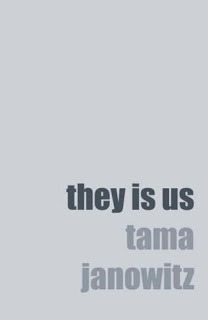
This book is called they is us. I like the pictures in it because I chose them. I like to color them in with soft color pencils. And I like to put some sticky mirrored paper on the front and back covers. You can buy this kind of paper on Canal Street in New York! They have all kinds of shiny paper in this store. I like the type that is silver with kind of holographic little squares. Also I like that it is a book with a front cover and a back cover and pages in between, that way I can look at it and think to myself, hey I wrote a book! And I got it published! Sometimes that makes me feel kind of good.
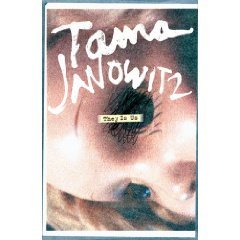
How much of what you do is:
a) formula dictated by the genre within which you write?
I would like to write a genre novel that would be popular but I don’t know how and it wouldn’t turn out right anyway or probably I would get bored and not finish it.
b) formula you developed yourself and stuck with?
I sure wish I had a formula and could stick with it. I don’t know what the formula would be.
c) as close to complete originality as it’s possible to get each time?
I don’t think it possible to be completely original and there is no such thing since we have to use things like ‘“oh no, you’re kidding!” he said.’ But I hope I can be a little bit fresh in my use of language or characters and style.
Who’s the greatest stylist currently writing?
There have been many great stylists and all different, Nabokov who could sling a sentence like a rope of rubies and strangle you with its brilliance. Or Virginia Wolff – the first to write as if really inside the person’s or people’s heads. But one kind of style does not negate another and as for today’s greatest stylist, I suppose there could be many, I do not keep up with or read that much current fiction.
Do you have a pain from childhood that compels you to write? If not, what does?
I do not know what compels me to write. I do not have a childhood pain or at least no more than anyone else. I do not like to write and I do not make any money off writing and I do not have any readers but a few and I have many nasty things written about my writing and I find writing depressing and boring but I keep writing and I do not know why.
What’s the best idea for marketing a book you can do yourself?
I really would not know. My first book American Dad did not sell any copies and when my next book Slaves of New York was published whenever they telephoned me from the publisher to say so and so wanted to interview me, I said, ok, because it had been so hard to sell my second book since my first book hadn’t sold and I kept writing books but nobody would publish them and so I switched to short stories because they took less time to write and get rejected but then the New Yorker started publishing me and then a company did want to publish a book of my short stories. So I always did what they asked me to do, they hired a company to make a short video of me and then I kept doing whatever they asked me to do. Then I did some advertisements. I was broke and I had only received three thousand five hundred dollars for that book. However then the press and people said I was out for publicity. And they said ‘a real writer would not do advertisements.’ There were editorials in the newspaper about my evilness. However nowadays not only are many writers making their own videos for Youtube to promote their books, over the many years before me authors who did commericals/adverts were: Fitzgerald, Faulkner, Steinbeck, Hemingway (whisky I think) Lillian Hellman; John Irving (am-ex); Norman Mailer (Trump Airline) and then after me Joan Didion did an ad (The Gap) and many others. Then a nasty little writer did an interview and called me a ‘whore’ for doing adverts. He said he had been asked to do adverts but he would not do so! Of course he had many many rich wives to support him, so I guess he didn’t need to!
What’s your experience with being translated?
I do not speak or read another language fluently enough to be able to tell how well or poorly a book of mine has been translated. Once someone began reading Kafka’s Metamorphosis in original German and I was stunned at the sound of the words and how much richer it sounded in German than English. I know that the couple who recently did a new translation of ‘Anna Karenina’ gave that book a whole new life and probably a lot of books have lost a lot in translation – people sometimes tell me ‘such-and-such’ a translation of one of my books was good or bad. It is hard for me to care however since in all these years I never got any royalty check beyond the original one or two thousand for initial rights of a book being sold. I figure what you get up front is all you are ever going to get; but since I do not take an advance but must write on my own first, I do not get any money – because publishers want to give you money based on an ‘idea’ but are always disappointed by what you end up writing. The only exceptions to this are a first time novelist who has already finished a book but does not have a track record – publishers will jump on this – or a book from the p.o.v. of a different culture – say, an Iraqi growing up in London or a Chinese person in Canada or . . . etc. etc. These books – let’s say, a girl from Jamaica writing about her family’s history and moving to the USA – are what get the Pulitzer and other prizes these days.
Do you live entirely off your writing? How many books did you write before could make a living at it?
I made a living from my writing for about three years. Before that I just kept at it and would get very tiny amounts here and there from small prize or small publication; then after I no longer made any money fortunately my husband did start to make money and he has been very, very kind and supportive emotionally and financially – I still have hopes that someday I might once again make a few dollars. For at this time had I spent the last 28 years working at McDonalds I would have earned more on a per annum basis.
How many books did you write before you were published?
I did write a few books before I got published as I had read that Doris Lessing wrote five books before she got ‘the first’ published. In my case though my first book American Dad did get published first in 1981, however, then some of the other earlier books I put into a drawer, I chopped up into stories
What’s the strangest thing that happened to you on a book tour?
Many things have happened but one thing that stands out is I was in Minneapolis and there were three people who came to hear me read/speak and there were many, many chairs set up and the staff disappeared and then the fourth person arrived and he resembled a murderer or serial killer and he sat in the front row and he had a metallic suitcase and I began to read and he opened his suitcase and I thought now he will take out a gun or knife. But instead he took out a book and began to read it. But it was not my book and he was not reading along to himself with what I was reading. It was a completely different book by a different person.
Another time I had a publicist from the company who sent me out on a ‘book tour’ only she did not book me in any media or readings and so I went from city to city picked up by an escort and then sat in the hotel; sometimes the escort would wonder why the publicist had not booked me on various tv shows/interviews etc that would have been happy to have had me. When I mentioned to the publicist that I wasn’t doing anything but sitting in my hotel she began to scream at me at the top of her lungs that it was all my fault.
What’s your weirdest idea for a book you’ll never get to publish?
I do not have weird ideas, I have regular ideas but they don’t come out normal.



